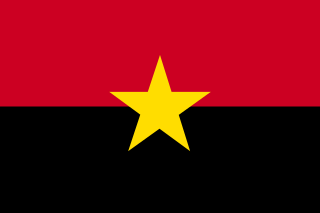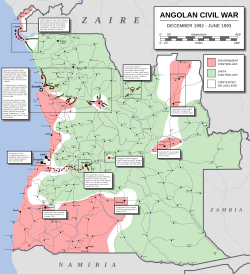
The current political regime in Angola is presidentialism, in which the President of the Republic is also head of state and government; it is advised by a Council of Ministers, which together with the President form the national executive power. Legislative power rests with the 220 parliamentarians elected to the National Assembly. The President of the Republic, together with the parliament, appoints the majority of the members of the two highest bodies of the judiciary, that is, the Constitutional Court and the Supreme Court. The judiciary is still made up of the Court of Auditors and the Supreme Military Court.

Angola was first settled by San hunter-gatherer societies before the northern domains came under the rule of Bantu states such as Kongo and Ndongo. In the 15th century, Portuguese colonists began trading, and a settlement was established at Luanda during the 16th century. Portugal annexed territories in the region which were ruled as a colony from 1655, and Angola was incorporated as an overseas province of Portugal in 1951. After the Angolan War of Independence, which ended in 1974 with an army mutiny and leftist coup in Lisbon, Angola achieved independence in 1975 through the Alvor Agreement. After independence, Angola entered a long period of civil war that lasted until 2002.

The National Union for the Total Independence of Angola is the second-largest political party in Angola. Founded in 1966, UNITA fought alongside the Popular Movement for the Liberation of Angola (MPLA) and the National Liberation Front of Angola (FNLA) in the Angolan War for Independence (1961–1975) and then against the MPLA in the ensuing civil war (1975–2002). The war was one of the most prominent Cold War proxy wars, with UNITA receiving military aid initially from the People's Republic of China from 1966 until October 1975 and later from the United States and apartheid South Africa while the MPLA received support from the Soviet Union and its allies, especially Cuba.

The People's Movement for the Liberation of Angola, for some years called the People's Movement for the Liberation of Angola – Labour Party, is an Angolan social democratic political party. The MPLA fought against the Portuguese Army in the Angolan War of Independence from 1961 to 1974, and defeated the National Union for the Total Independence of Angola (UNITA) and the National Liberation Front of Angola (FNLA) in the Angolan Civil War. The party has ruled Angola since the country's independence from Portugal in 1975, being the de facto government throughout the civil war and continuing to rule afterwards.

The national flag of Angola came into use when Angola gained independence on November 11, 1975. It is split horizontally into an upper red half and a lower black half with an emblem resting at the center. It features a yellow half gear wheel crossed by a machete and crowned with a star.

The National Front for the Liberation of Angola is a political party and former militant organisation that fought for Angolan independence from Portugal in the war of independence, under the leadership of Holden Roberto.

The Angolan War of Independence, known as the Luta Armada de Libertação Nacional in Angola, began as an uprising against forced cultivation of cotton and evolved into a multi-faction struggle for control of Portugal's overseas province of Angola among three nationalist movements and a separatist movement. The war ended when a peaceful coup in Lisbon in April 1974 overthrew Portugal's Estado Novo dictatorship and the new regime immediately stopped all military action in the African colonies, declaring its intention to grant them independence without delay.

Álvaro Holden Roberto was an Angolan politician who founded and led the National Liberation Front of Angola (FNLA) from 1962 to 1999. His memoirs are unfinished.

The Angolan Civil War was a civil war in Angola, beginning in 1975 and continuing, with interludes, until 2002. The war began immediately after Angola became independent from Portugal in November 1975. It was a power struggle between two former anti-colonial guerrilla movements, the communist People's Movement for the Liberation of Angola (MPLA) and the anti-communist National Union for the Total Independence of Angola (UNITA).

Operation Savannah was the South African code name for their military incursion into Angola in 1975–1976. It was part of the South African Border War and arose due to the Angolan War of Independence. The operation also materially influenced the subsequent Angolan Civil War. South African forces invaded deep into Angola with the objective of driving the MPLA, Soviet and Cuban forces out of southern Angola so as to strengthen the position of UNITA, the main opponent of the MPLA and an ally of South Africa.
The Alvor Agreement, signed on 15 January 1975 in Alvor, Portugal, granted Angola independence from Portugal on 11 November and formally ended the 13-year-long Angolan War of Independence.
The military history of Angola is marked by a series of conflicts rooted in tribal conflicts, colonialism and the Cold War. During the Cold War, Angola was involved in struggles between Western powers and South Africa with the help of the Soviet Union and Cuba.

Since its independence from Portugal in 1975, Angola has had three constitutions. The first came into force in 1975 as an "interim" measure; the second was approved in a 1992 referendum, and the third one was instituted in 2010.
The 1970s in Angola, a time of political and military turbulence, saw the end of Angola's War of Independence (1961–1975) and the outbreak of civil war (1975–2002). Agostinho Neto, the leader of the People's Movement for the Liberation of Angola (MPLA), declared the independence of the People's Republic of Angola on November 11, 1975, in accordance with the Alvor Accords. UNITA and the FNLA also declared Angolan independence as the Social Democratic Republic of Angola based in Huambo and the Democratic Republic of Angola based in Ambriz. FLEC, armed and backed by the French government, declared the independence of the Republic of Cabinda from Paris. The National Liberation Front of Angola (FNLA) and the National Union for the Total Independence of Angola (UNITA) forged an alliance on November 23, proclaiming their own coalition government based in Huambo with Holden Roberto and Jonas Savimbi as co-presidents and José Ndelé and Johnny Pinnock Eduardo as co-Prime Ministers.

Relations between Angola and China predate the former's independence. Today, they are based on an emerging trade relationship. As of 2021, Angola was China's third-largest trading partner in Africa. The two countries announced a comprehensive strategic partnership in 2024.

The Cuban intervention in Angola began on 5 November 1975, when Cuba sent combat troops in support of the communist-aligned People's Movement for the Liberation of Angola (MPLA) against the pro-western National Union for the Total Independence of Angola (UNITA) and National Liberation Front of Angola (FNLA). The intervention came after the outbreak of the Angolan Civil War, which occurred after the former Portuguese colony was granted independence after the Angolan War of Independence. The civil war quickly became a proxy war between the Eastern Bloc led by the Soviet Union and the Western Bloc led by the United States. South Africa and the United States backed UNITA and the FNLA, while communist nations backed the MPLA.

During Angola's civil war, Cuban forces fought alongside the Marxist–Leninist People's Movement for the Liberation of Angola (MPLA) government; against the Western-backed National Union for the Total Independence of Angola (UNITA) and National Liberation Front of Angola (FNLA) guerrillas who were aided by the South-African army. The present day outcome of the war resulted in the MPLA changing from a Marxist–Leninist party to a multi-party democratic system based on neoliberal principles. From an economic standpoint, Cuba has lost its preferred status among Angolans and South Africa has become the biggest single investor and trading partner with Angola.
In the Angola–Cuba Declaration of 1984, signed 19 March 1984 in Havana by president José Eduardo dos Santos of Angola and Fidel Castro, premier of Cuba, the two countries agreed to the withdrawal of Cuban forces from Angola after the withdrawal of South African troops from Angola and Namibia, and after UN-Security Council resolution 435 on Namibian independence was strictly applied.

The People's Republic of Angola was the self-declared socialist state which governed Angola from its independence in 1975 until 25 August 1992, during the Angolan Civil War.















